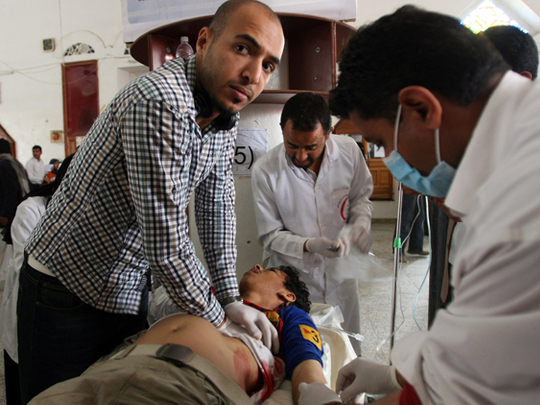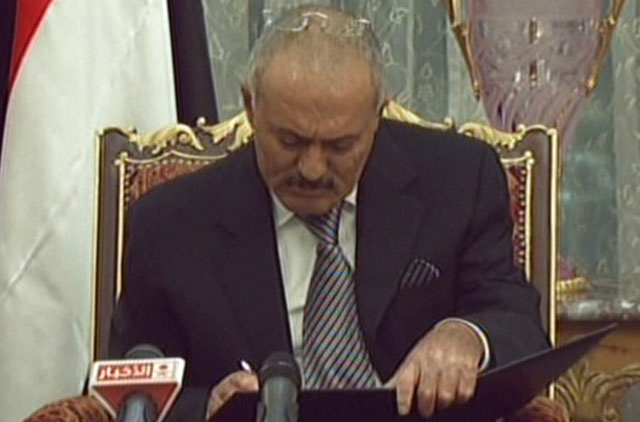
Sana'a: The seal of approval of Yemen President Ali Abdullah for the GCC-brokered deal on Wednesday night has sparked a nation-wide wave of anger among the anti-regime protesters who have been camping out in the streets of the country for 10 months, demanding the resignation and prosecution of Saleh.
For the first time since beginning of the uprising, protesters raised their tone and accused the opposition, which signed the deal, of exploiting the protesters to pressure the regime.
Yemen protesters, who are mostly young and students, stuck to their guns and refused to accept the GCC deal, saying they will continue in their daily protests till they remove the regime and bring it to trial.
In the first incident since the endorsement of the GCC deal, five protesters were killed and twenty four injured on Thursday in Sana'a when armed government loyalists opened fire on thousands of protesters marched through the streets to reject the GCC deal, Dr Mohammad Al Qubati, who runs the field hospital in Change Square .
"I saw for the first time protesters died before arriving the hospital. In the past we used to have protesters breathing their last breath in the hospital, but today all of them were killed in the streets."
Rejection
Also, in the Yemen's largest city Taiz, where Saleh forces killed dozens of protesters, protesters in the city's main camping square voiced their rejection to the deal that gives Saleh's regime immunity from prosecution and vowed to continue press up till their remove the regime. Another huge gatherings assembled in most of Yemen city's decrying the deal ad regarded it as" treason to the blood of martyr".
Salah Noa'man, a protest activist, said that Taiz tens of thousands in the city raised slogans criticizing the opposition's Joint Meeting Party and accused them of hijacking the revolution and ignoring the blood of those killed by the government.
Bring justice to the dead
"We vowed to the families of the dead protesters that we would bring their killers of their children to justice and will sit tight until we reach that end."
Salah claimed that Saleh would not have signed the deal without the pressure of the protesters in the streets.
"We will continue protesting till we fulfill our other goals of establishing a civilian state and prosecuting the killers of protesters. "
Official reaction
Following Saleh's signature, Yemen ministry of defense reported that the troubled leader would come back home to supervise the implementation of the deal on the ground. The website was responding to some media reports that Saleh could travel to New York and stay in the Saudi Arabia for treatment.
Government media stated that the signature of the GCC deal is a victory to the "constitutional legitimacy".
In its editorial on Thursday, government-run Al-Thawara daily lauded the agreement and described it as historical.
Triumph over desire for violence
"Yemen wisdom has triumphed over the desires of violence, revenge and hatred and the agreement has returned power to the grassroots through their democratic choices that they have chosen as a way of life."
The newspaper said that the agreement will be successful if it was implemented collectively and the opposition avoided ways of circumvention, maneuvering and cherry picking.
Victory
Ali Al Jaradi, editor of al-Ahali weekly newspaper, told Gulf News that Saleh's transfer of power to his deputy Abdu Rabu Manosur Hadi achieved one of the goals of the protesters and this step presents a serious challenge to Mr Hadi.
"The signature of the GCC plan has fulfilled one of the objectives of the youth revolution which was the departure of Saleh and they can achieve the rest by keeping up their demonstrations."
Mr Al Jaradi thinks that the success of post-Saleh era depends on the deputy's ability to run the country and how he will start the reconstruction of the country.
Al Huthi rebels
Al Huthi rebels, Saleh's archenemy who fought six wars with the government forces in northern Yemen, rejected the GCC deal and pledged to support the protesters until they accomplish all of their demands. Saleh has accused the Shira rebels of seeking to declare their own sectarian state in the northern country.
In a statement, the rebels considered any political settlement with the regime as a treason to the sacrifice of the dead protesters, adding that the GCC deal is an attempt to abort the revolution and the agreement only falls in the interests on the regime and the countries that introduced it













